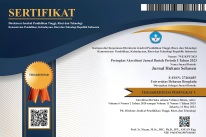Liability Of Business Actors For Breaches In Electronic Banking Systems
Abstract
The main objective of this study is to analyze the legal consequences arising from data and funds breaches in electronic banking systems. This research uses a normative legal research method to examine the responsibilities of business actors in cases of electronic banking system breaches. The approaches used include legislative and conceptual approaches. The legal materials consist of primary legislation such as the 1945 Constitution, the Civil Code, and various laws related to banking, consumer protection, and personal data protection, supplemented by secondary and tertiary materials such as books, articles, and dictionaries. The legal materials are gathered through documentary studies to collect, analyze, and summarize information from relevant documents. Qualitative analysis is employed to provide a description and draw conclusions based on the available legal materials. The research findings indicate that the legal consequences of breaches of data and funds in electronic banking systems entail legal responsibility for the business actors. If the breach is due to the bank's error or negligence, the bank is required to compensate the customer for the amount lost. However, if the loss is due to the customer's own negligence, the bank is not liable for compensation. For legal protection, preventive measures include insuring customer funds through the Deposit Insurance Corporation, as stipulated in banking regulations. Additionally, repressive protection involves civil legal claims based on unlawful acts, with dispute resolution available through both non-litigation and litigation routes according to the Consumer Protection Law and the Electronic Information and Transactions Law.
Downloads
Copyright (c) 2024 Reihana Pemuli, Abdul Halim Barkatullah

This work is licensed under a Creative Commons Attribution-ShareAlike 4.0 International License.






